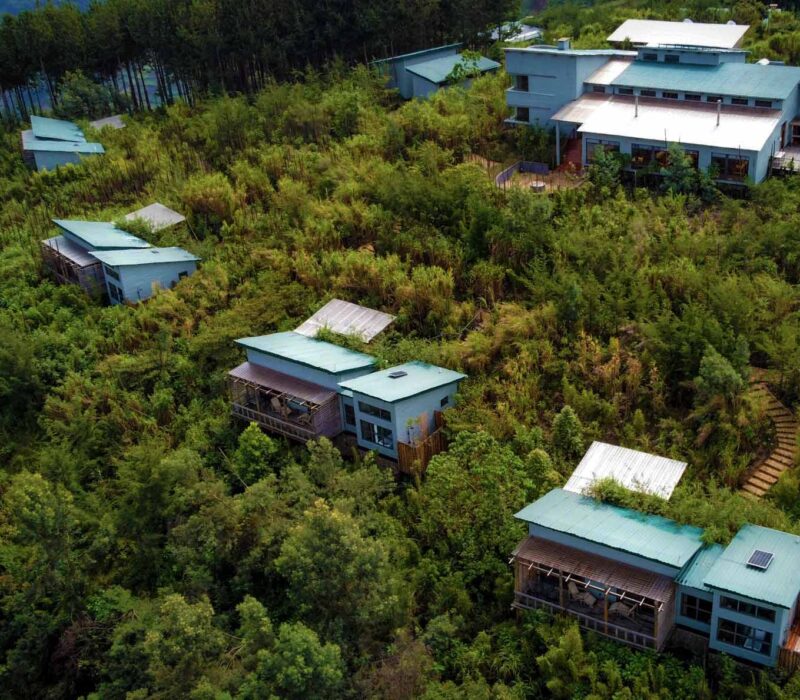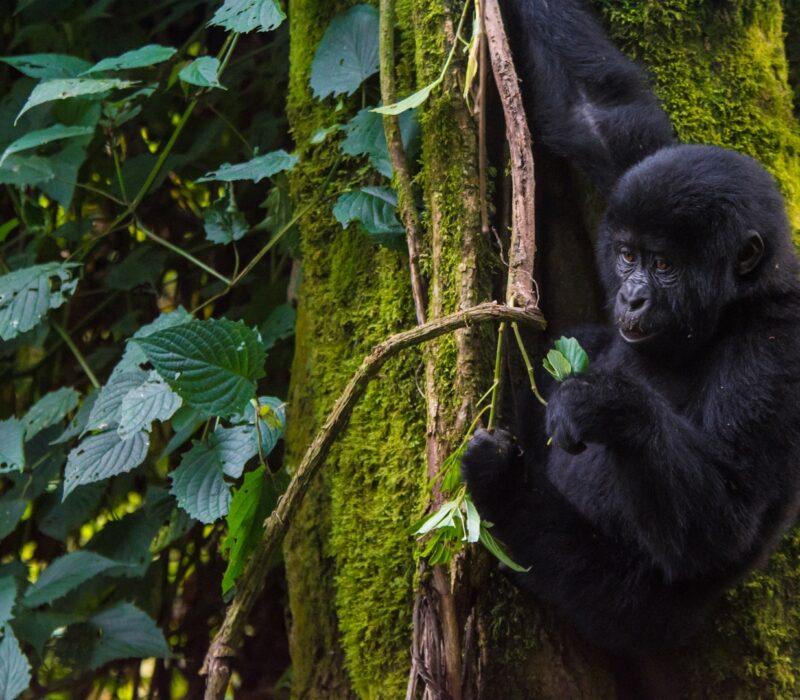Sustainable Tourism in Bwindi Impenetrable National Park
Whilst ecotourism has undoubtedly achieved remarkable success, it is imperative to acknowledge the existing challenges that pose a threat to the continued existence of the majestic mountain gorillas in their natural habitat. Among these challenges, a tangible concern arises when it comes to the delicate balance between humans and gorillas due to our close genetic proximity. The potential transmission of viral or bacterial infections from humans to these extraordinary creatures looms as a genuine risk.
In order to mitigate this risk and ensure the utmost protection of both our esteemed guests and the precious gorillas, we encourage our guests to adhere to recommended measures. A select number of privileged visitors are granted the opportunity to embark on this extraordinary journey at a time, ensuring an exclusive and intimate encounter with these gentle giants. As a symbol of respect and reverence, all guests are kindly requested to adorn surgical or face masks, serving as a protective barrier against any potential transmission. Additionally, maintaining a respectful distance of several meters from the gorillas further safeguards their well-being.
At our luxurious sanctuary, we prioritize the safety and preservation of both our distinguished guests and the remarkable mountain gorillas. It is with utmost care and unwavering dedication that we strive to provide an unparalleled experience of both elegance and conservation.
Sustainable Tourism in Ruhija Sector Bwindi Impenetrable Forest
The Ruhija sector of Bwindi Impenetrable Forest in Uganda is known for its rich biodiversity and as one of the key locations for gorilla tracking, a popular ecotourism activity. Sustainable tourism in this area is crucial for the conservation of the forest, the protection of its wildlife, and the well-being of local communities.
By implementing these sustainable tourism practices, the Ruhija sector of Bwindi Impenetrable Forest can continue to attract tourists while safeguarding its natural and cultural heritage for future generations. This approach not only benefits the environment and local communities but also ensures the long-term viability of tourism in the region.
Key aspects of sustainable tourism in the Ruhija
Gorilla Tracking Management
Gorilla tracking is the primary attraction in the Ruhija sector. Sustainable tourism management includes limiting the number of permits issued each day to minimize stress on gorilla populations. It also involves strict guidelines for visitor behavior during treks to ensure minimal disturbance to the gorillas and their natural habitat.
Community Involvement
Engaging local communities in tourism activities is essential. This includes employing local guides and porters, sourcing food and products from local markets, and supporting community-based tourism initiatives. Revenue-sharing mechanisms are in place to ensure that a significant portion of the income generated from tourism goes back to these communities.
Environmental Conservation
Bwindi Impenetrable Forest is a UNESCO World Heritage site, and preserving its unique ecosystems is paramount. Sustainable tourism efforts focus on minimizing the environmental impact of tourism activities. This involves responsible waste management, limiting the construction of large-scale infrastructure, and promoting eco-friendly practices among tourists.
Education and Awareness
Educating tourists about the importance of conservation and responsible tourism is crucial. Interpretive centers, educational programs, and guided tours can help visitors understand the significance of the forest’s biodiversity and cultural heritage.
Regulation and Monitoring
Effective regulation and monitoring of tourism activities are essential to prevent overcrowding and overuse of the forest. Park authorities should have mechanisms in place to track visitor numbers and adjust permit quotas as needed to prevent ecological degradation.
Infrastructure and Accommodation
Sustainable tourism also involves the responsible development of infrastructure and accommodation options. Kiho Gorilla Safari Lodge was designed with eco-friendly principles in mind, such as using renewable energy sources and minimizing water consumption.
Research and Conservation Efforts
Sustainable tourism can contribute to research and conservation efforts. Funds generated from Kiho Gorilla safari lodge and its tourism can be channeled into conservation programs, anti-poaching initiatives, and scientific research to better understand and protect the forest’s biodiversity.
Promotion of Responsible Tourism Practices
Tour operators and guides play a role in promoting responsible tourism practices among visitors. This includes guidelines on waste disposal, minimizing noise pollution, and respecting the local culture and customs.


